Will Trump Have His Own Reichstag Fire?
If Attorney General William Barr succeeds in legitimizing a right-wing conspiracy theory, it could spell the end of American democracy.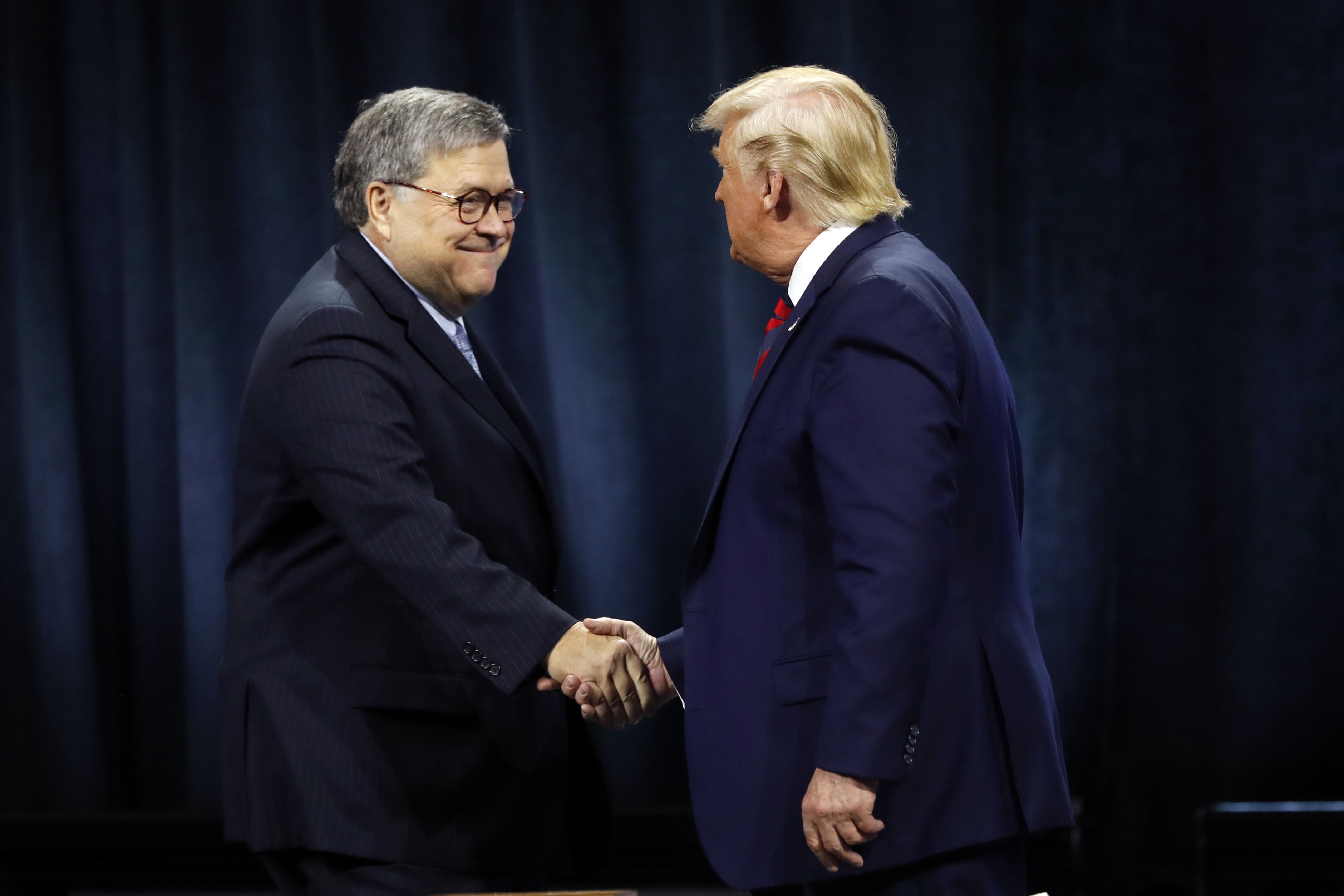 Attorney General William Barr and Donald Trump. (Charles Rex Arbogast / AP)
Attorney General William Barr and Donald Trump. (Charles Rex Arbogast / AP)
This piece originally appeared on The Progressive.
On February 27, 1933, roughly one month after Adolf Hitler was sworn in as chancellor of Germany, the Reichstag building housing the German parliament in Berlin was gutted by a fire. Hitler and the Nazi Party blamed the conflagration on communist agitators, and the next day they pressured German President Paul von Hindenburg to issue an emergency decree suspending freedom of assembly and the press.
Four weeks later, the nation’s parliament passed the Enabling Act, permitting Hitler as chancellor to enact laws by decree. After Hindenburg’s death in August 1934, the offices of chancellor and president were merged, giving Hitler absolute control of the German state.
Although four communists were arrested, tried, and executed for staging the Reichstag fire, including a hapless twenty-four-year-old Dutch national who allegedly confessed to the arson, the cause of the blaze has been a subject of sharp and enduring debate. Some notable writers—including the British historian Alan Bullock, the American war correspondent William Shirer and, more recently, the prominent German lawyer Benjamin Hett—have argued that the fire was set by the Nazis themselves to foster a climate of fear that allowed them to crush all forms of political dissent and govern with impunity.
Whatever the actual cause of the Reichstag fire, the incident has assumed outsized status over the decades as a meme and metaphor for political subterfuge and conspiracies on a massive scale.
Now don’t get me wrong. I am not about to suggest that Donald Trump and his Attorney General, William Barr, are scheming to burn down the U.S. Capitol Building and blame the deed on Nancy Pelosi and the Democrats in order to endow Trump with autocratic, neo-fascist powers.
I am suggesting, however, that Trump has dispatched Barr on a Reichstag-esque mission to promote a wacky and discredited right-wing conspiracy theory that could, if given widespread credence, discredit the findings of former special counsel Robert Mueller on Russian election interference, divert public attention from Trump’s manifold acts of corruption, and cripple the impeachment inquiry initiated against the President.
As other commentators have noted, Barr is chasing a conspiracy theory that originates from the darkest corners of the rightwing Internet. It holds that Ukraine, not Russia, meddled in our 2016 election, and was responsible for hacking into the emails of the Democratic National Committee. It posits, without a shred of evidence, that Ukrainian operatives acted in concert with the DNC, the Clinton campaign, and rogue elements inside the CIA and FBI to make it appear that the email hack was carried out by the Russians to stymie Trump’s presidential bid.
Trump raised the conspiracy theory in his infamous July 25 telephone conversation with Ukraine President Volodymyr Zelensky. The call, in turn, triggered the current impeachment inquiry after the conversation between the two leaders was publicly revealed in late September following the disclosure of an anonymous whistleblower’s complaint.
In addition to asking Zelensky to dig up dirt on Joe and Hunter Biden, Trump during this call pressured Zelensky to “find out what happened with this whole situation with Ukraine” in 2016, and specifically to help find out what happened to a computer server allegedly belonging to Crowdstrike, Inc., the California-based tech firm that provided cybersecurity services to the Democrats in 2016. “They say,” Trump told Zelensky without defining who they are, “Ukraine has it [the server].”
Barr, with Trump’s blessings, announced in May that he had appointed John Durham, the U.S. Attorney for Connecticut, to lead the Justice Department in an administrative review of the origins of the Russia inquiry conducted by Mueller. Last month, it was announced that the DOJ had converted the probe into a criminal investigation, equipping the department with subpoena authority.
According to several news outlets, Barr has taken personal charge of the new probe, traveling to Britain and Italy to hold face-to-face meetings with government intelligence experts in those countries, and conferring by phone with Australian security officials.
Any pretense that Barr is acting on behalf of the country rather than in furtherance of Trump’s personal interests has fallen by the wayside. In Barr, Trump has finally found his Roy Cohn, as he longed for aloud in January 2018 in the thick of Mueller inquiry, referring to the deceased lawyer who had served as chief-counsel to Senator Joseph McCarthy. Cohn later worked as Trump’s private attorney in New York.
It’s too early to tell what kind of narrative Barr will ultimately confabulate to come to Trump’s rescue. In the meantime, the President’s other surrogates have been hard at work, auditioning defenses to impeachment, lambasting the impeachment process and contending, among other risible verbal broadsides, that Congressional Democrats are trying to engineer a coup d’état. Thus far, they have bungled their assignments.
As a sign of just how badly the impeachment battle has gone for Trump thus far, the President’s present personal attorney and initial go-to defender on Ukraine—former New York City Mayor Rudi Giuliani—is reportedly under investigation by federal prosecutors in Manhattan for violating lobbying laws in connection with his own business interests in Ukraine.
As House Democrats transition from the closed-door depositions they have been conducting the past few weeks to public hearings later this month, it appears more certain every day that Trump indeed attempted to pull off a quid pro quo bribery/extortion shakedown of Zelensky, clearly meeting the impeachment threshold of “high crimes and misdemeanors.”
But we’ve yet to hear from Barr. The Attorney General is Trump’s ace in the hole, and he is far more competent and dangerous than Giuliani, or Trump’s lackeys in Congress, or the sycophants who regularly sing Trump’s praises on Fox News.
It’s not entirely clear why a man with Barr’s credentials—he served as Attorney General under George H.W. Bush before joining a prestigious law firm in Washington, D.C.—would jeopardize his legacy by indulging Trump’s most irrational impulses.
One possible explanation is that Barr is a proponent of the legal doctrine of the “unitary executive.” Long popular in rightwing circles dating back to the Reagan era, the doctrine maintains that that all authority of the executive branch is concentrated in the person of the President, and that the presidency is largely immune from Congressional oversight.
Barr may believe he has found the perfect vehicle for the unitary theory in Trump. If that theory now prevails, it will remain in place for future conservative Presidents to utilize. If that’s the case, we can expect Barr to confect a figurative version of the Reichstag fire, endorsing the far right’s most blatant pro-Trump conspiracy theories, in the weeks and months ahead.
Whether Barr and Trump succeed remains to be seen. Nothing less than the fate of our fragile democracy hangs in the balance.
Your support is crucial…With an uncertain future and a new administration casting doubt on press freedoms, the danger is clear: The truth is at risk.
Now is the time to give. Your tax-deductible support allows us to dig deeper, delivering fearless investigative reporting and analysis that exposes what’s really happening — without compromise.
Stand with our courageous journalists. Donate today to protect a free press, uphold democracy and unearth untold stories.

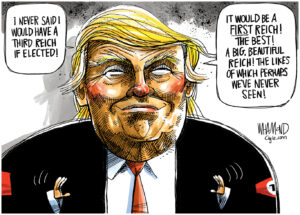
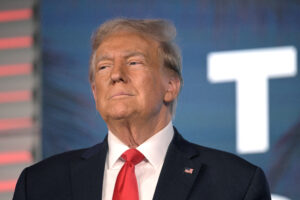
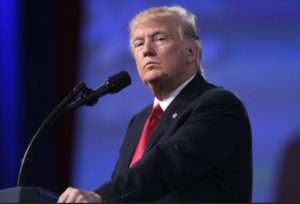
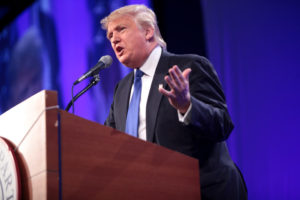
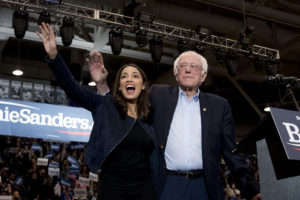
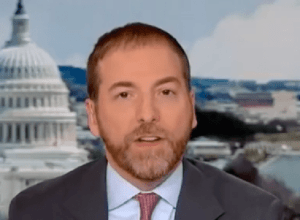


You need to be a supporter to comment.
There are currently no responses to this article.
Be the first to respond.